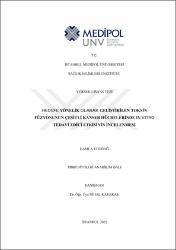| dc.contributor.advisor | Karakaş, Nihal | |
| dc.contributor.author | Uludağ, Damla | |
| dc.date.accessioned | 2021-09-22T06:32:58Z | |
| dc.date.available | 2021-09-22T06:32:58Z | |
| dc.date.issued | 2021 | en_US |
| dc.date.submitted | 2021-01-11 | |
| dc.identifier.citation | Uludağ, D. (2021). Hedefe yönelik olarak geliştirilen toksin füzyonunun çeşitli kanser hücrelerinde in vitro tedavi edici etkisinin incelenmesi. (Yayınlanmamış yüksek lisans tezi). İstanbul Medipol Üniversitesi Sağlık Bilimleri Enstitüsü, İstanbul. | en_US |
| dc.identifier.uri | https://hdl.handle.net/20.500.12511/8254 | |
| dc.description.abstract | Kanser hastalığı, tüm toplumlarda yaygın olarak görülmesine rağmen; genomik değişkenlik, tümörün nüks etmesi, kanser hücrelerinin heterojenitesi, sistemik toksisite gibi nedenlerden ötürü uygulanan tedavi yöntemleri yetersiz kalmaktadır. Yeni pre-klinik tedavi yaklaşımlarının da klinik faz çalışmalarında ilerleyememesindeki en önemli nedenlerinden biri mevcut tedavilerin kanser hücrelerine özgü olmamasıdır. Bu nedenle, hedefe yönelik tedavi stratejileri ön plana çıkmıştır. Bunlardan birisi de hedefe yönelik toksin füzyonlarıdır. Bu çalışmada, seçici olarak kanser hücrelerinde eksprese edilen bir reseptör olan IL13Rα2'yi hedeflemek üzere toksin füzyonu kullanılmıştır. Bu amaçla; IL13 ligandına entegre edilen Pseudomonas ekztoksini'nin (IL13-PE) çeşitli kanser türleri üzerindeki in vitro tedavi edici etkisi incelenmiştir. İlk olarak, çeşitli kanser türlerine ait hücre hatlarında, IL13Rα2 ekspresyon seviyeleri belirlenmiştir. Bu doğrultuda, pankreas kanseri hücresi; PANC-1, akciğer kanseri hücresi; NCI-H460, prostat kanseri hücresi; PC-3, melanoma kanseri hücreleri; MeWo, SKMEL-2 ve meme kanseri MDA-MB-157 ve MDA-MB-231 hücre hatlarında IL13Rα2 transkriptlerinin varlığı tespit edilmiştir. Ardından; IL13Rα2 transkripti tespit edilen hücreler, in vitro ve in vivo çalışmalarında kullanmak üzere floresan ve biyolüminesan proteinlerini birlikte kodlayan lentivirüsler ile biyogörüntülenebilir hale getirilmiştir. Daha sonra, toksine dirençli HEK-293T hücre hattından IL13-PE toksinini içeren medyumlar toplanmıştır. Kanser hücrelerinin, IL13-PE toksini ile muamelesinin ardından hücre canlılığının analizi yapılmıştır. IL13-PE toksinine karşı en iyi yanıtı veren kanser hücre hattının NCI-H460 akciğer kanser hücresi olduğu belirlenmiştir ve bu hücrelerde IL13-PE'ye bağlı hücre ölümü analiz edilmiştir. Sonuç olarak, IL13-PE toksininin farklı kanser türlerinde hedef reseptör seviyeleri ile uyumlu bir şekilde anlamlı derecede hücre ölümüne yol açtığı ve IL13-PE toksininin IL13Rα2 eksprese eden çeşitli kanser hücrelerini hedefleyebildiğini göstermiştir. Böylece bu çalışma ile, seçici bir şekilde kanser hücrelerini hedefleyen IL13-PE toksininin, birçok kanser türü için in vitro tedavi edici etkisi saptanmış olup, pre-klinik ve klinik çalışmalarda uygulanabilecek potansiyel bir terapötik aday olduğu gösterilmiştir. Bu tez çalışması, 117S421 proje numaralı TÜBİTAK 1001 projesi kapsamında desteklenmektedir. | en_US |
| dc.description.abstract | Although cancer disease is common in all societies; current treatment methods are limited due to genomic instability, tumor recurrence, heterogeneity of cancer cells, systemic toxicity and the lack of cancer cell selectivity. One of the most important limitations with failure of new pre-clinical treatment approaches in clinical phase studies is that the treatments are not specific to cancer cells. Consequently, targeted treatment strategies have come to the fore andone of these strategies is use of targeted toxin fusions. In line with this, toxin fusions were used in this study to target a mutant receptor; IL13Rα2, that is selectively expressed on cancer cells., For this aim, ; the in vitro therapeutic effects of IL13 fused Pseudomonas exotoxin (IL13-PE) has been evaluated in variouscancers. First of all, IL13Rα2 expression levels in cell lines of several cancer types were determined. In this direction, the presence of IL13Rα2 transcripts were detected in pancreatic cancer cell; PANC-1, lung cancer cell; NCI-H460, prostate cancer cell; PC-3, melanoma cancer cells; MeWo, SKMEL-2 and breast cancer MDA-MB-157 and MDA-MB-231 cell lines. Afterwards, prior to in vitro and in vivo studies, IL13Rα2 expressing bioimagable cancer cells were established using lentiviral vectors bearing an integration of fluorescent and bioluminescent proteins. Subsequently, IL13-PE containing conditioned medium was collected from the IL13-PE transfected toxin resistant HEK-293T cell line. Cell viability of cancer cells were then analyzed upon treatment with IL13-PE toxin. Although IL13Rα2 expressing several cancer cell lines gave significant therapeutic response to IL13-PE toxin, the most significant cell death was detected in NCI H460 lung cancer cell line and for this reason, further analysis of IL13-PE triggered cell death was maintained in this line. Apoptotic and necrotic cell death were detected in IL13-PE treated NCIh460 lung cancer cells. What is more, IL13-PE toxin has been shown to induce significant cell death in different types of cancers in correlation with cognate receptor expression levels. As a result, it has been shown that IL13-PE toxin induces significant cell death in different cancer types, consistent with target receptor levels, and that IL13-PE toxin can target a variety of cancer cells expressing IL13Rα2. Thus, with this study, IL13-PE toxin, which selectively targets cancer cells, has been found to have an in vitro therapeutic effect for many types of cancer and has been shown to be a potential therapeutic candidate that can be applied in pre-clinical and clinical studies. This thesis study is supported within the scope of TÜBİTAK 1001 project with project number 117S421. | en_US |
| dc.language.iso | tur | en_US |
| dc.publisher | İstanbul Medipol Üniversitesi Sağlık Bilimleri Enstitüsü | en_US |
| dc.rights | info:eu-repo/semantics/openAccess | en_US |
| dc.subject | Hedefe Yönelik Toksin Füzyonu | en_US |
| dc.subject | IL13Rα2 | en_US |
| dc.subject | IL13-PE | en_US |
| dc.subject | Kanser | en_US |
| dc.subject | Pseudomonas Ekzotoksin | en_US |
| dc.subject | Cancer | en_US |
| dc.subject | IL13 | en_US |
| dc.subject | IL13Rα2 | en_US |
| dc.subject | IL13-PE | en_US |
| dc.subject | Targeted Toxin Fusion | en_US |
| dc.title | Hedefe yönelik olarak geliştirilen toksin füzyonunun çeşitli kanser hücrelerinde in vitro tedavi edici etkisinin incelenmesi | en_US |
| dc.title.alternative | Investigation of the in vitro therapeutic effects of targeted toxin fusion on various cancer cells | en_US |
| dc.type | masterThesis | en_US |
| dc.department | İstanbul Medipol Üniversitesi, Sağlık Bilimleri Enstitüsü, Tıbbi Biyoloji Ana Bilim Dalı | en_US |
| dc.relation.publicationcategory | Tez | en_US |


















